
Red background with a picture of a bull in a thoughtbubble from the 'i' in Bullshift.
Praise for Bullshift
De Goey provides investors with an entertaining overview of how our brains get in the way of maximizing our financial potential. Perhaps more importantly, he links these biases to what is happening in the world around us and provides prescriptions on how to optimize our behaviour.
P reet B anerjee , consultant to the wealth management industry and founder of MoneyGaps
Long a maverick in the Canadian financial adviser community, John De Goeys third book is an erudite exposition of how unwarranted optimism can be detrimental to the financial health of portfolios.
J onathan C hevreau , author, columnist, and founder of Financial Independence Hub
From broad behavioural errors to the specifics of Canadian markets, Bullshift offers new ways for people to evaluate their thinking and achieve better outcomes. Its packed with useful insight on how to make more informed, rational decisions.
D r . C heryl H urst , founder of equity, diversity, and inclusion corporate learning platform PeopleGaps
If you want to be money smart, read Bullshift. Johns decades of experience, wisdom, and guidance will leave you richer.
K elley K eehn , bestselling author of Talk Money to Me
A truly wonderful read and an important book that will help so many people solve the puzzle that is understanding themselves, their money, and their behaviours.
D ennis M oseley -W illiams , founder of DMW Strategic Consulting
Theres a large body of evidence that behavioural biases are a significant reason why so many investors fail to achieve their investment goals. Overconfidence is particularly deeply ingrained. We think and are encouraged by the media and financial commentators to think that we can do things that are beyond our sphere of competence. Were all prone to overconfidence and optimism and we need to help each other in guarding against it.
R obin P owell , journalist, author, and editor of The Evidence-Based Investor
Theres a new kind of adviser coming to the forefront of wealth management. These days, advisers who are more focused on behaviour and decisions are winning business. Understanding what drives client attitudes is a winning proposition for keeping them focused on whats important.
C harlie S piring , ICD.D, founder and chair of Wellington-Altus Financial Inc.
Bull Shift

Bull Shift
How Optimism Bias Threatens Your Finances
John J. De Goey

Copyright John J. De Goey, 2023
All rights reserved. No part of this publication may be reproduced, stored in a retrieval system, or transmitted in any form or by any means, electronic, mechanical, photocopying, recording, or otherwise (except for brief passages for purpose of review) without the prior permission of Dundurn Press. Permission to photocopy should be requested from Access Copyright.
Publisher: Kwame Scott Fraser | Acquiring editor: Kathryn Lane | Editor: Dominic Farrell
Cover designer: Karen Alexiou
Cover image: istock.com/ArtnivoraStudio
Interior cartoons: Mark Krause
Library and Archives Canada Cataloguing in Publication
Title: Bullshift : how optimism bias threatens your finances / John J. De Goey.
Names: De Goey, John J., author.
Description: Includes bibliographical references and index.
Identifiers: Canadiana (print) 20220417105 | Canadiana (ebook) 20220417121 | ISBN 9781459750906 (softcover) | ISBN 9781459750913 (PDF) | ISBN 9781459750920 (EPUB)
Subjects: LCSH: Investments. | LCSH: Finance, Personal.
Classification: LCC HG4521 .D4 2023 | DDC 332.6dc23

We acknowledge the support of the Canada Council for the Arts and the Ontario Arts Council for our publishing program. We also acknowledge the financial support of the Government of Ontario, through the Ontario Book Publishing Tax Credit and Ontario Creates, and the Government of Canada.
Care has been taken to trace the ownership of copyright material used in this book. The author and the publisher welcome any information enabling them to rectify any references or credits in subsequent editions.
The publisher is not responsible for websites or their content unless they are owned by the publisher.
Printed and bound in Canada.
Dundurn Press
1382 Queen Street East
Toronto, Ontario, Canada M4L 1C9
dundurn.com, @dundurnpress 


For Olena
Contents
Introduction
Bias is a Part of Life . We all have biases whether we want them or not and whether we are aware of them or not. It would be unfair to criticize someone for having biases that would be tantamount to criticizing that person for being human.
A bias may be good or bad; to judge that, it is necessary to consider the consequences if someone acts on that bias. The thing is, though, acting on some biases can, depending on the circumstances, produce different kinds of consequences. So, making judgments about the positive or negative nature of different kinds of bias is not always easy to do. In any case, it is unfair to impugn someones character simply because they have biases.
Its entirely reasonable to expect professionals, no matter what field they work in, to act with honour. They should be expected to go about their business in a way that is proper, rational, and ethical and almost all professionals (financial advisers, doctors, dentists, lawyers, accountants, teachers, engineers, et cetera) intend to do good work using the best evidence available to them. Like the rest of us, however, professionals are subject to different kinds and different amounts of bias conscious and unconscious. Obviously, their biases can impair their ability to serve their clients well.
The problem is a delicate one, but it is a critically important one and a particular problem for consumer advocates. Everyone wants protection from bad actors. Weve all heard stories about accountants who file aggressively because they know the Canada Revenue Agency hasnt historically audited the line item that is being fudged. For better or worse, those professionals likely know they are taking chances. But what about those actors who are not bad, who are only human? In those cases, the notion of true culpability shifts. What if the bad actors dont know theyre bad?
How can we solve problems that we dont even recognize? The answer lies in introspection, humility, and having a genuine desire to gain self-awareness. The time has come for all of us to reflect on our predispositions and actively challenge them, especially where the presumptive right answers no longer hold water.

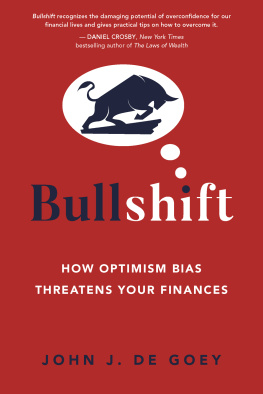

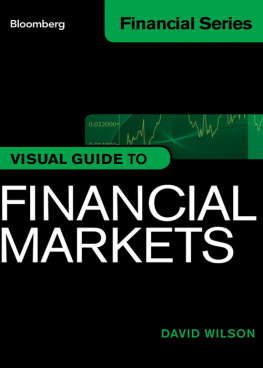
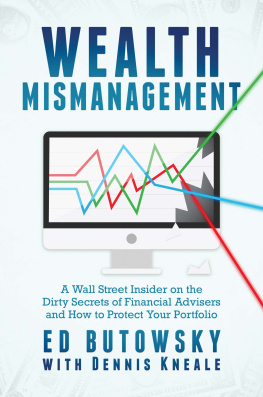

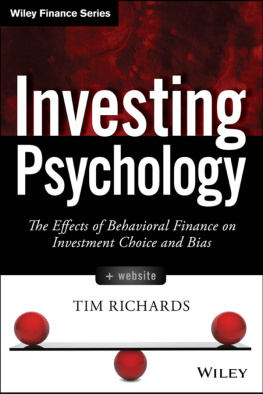
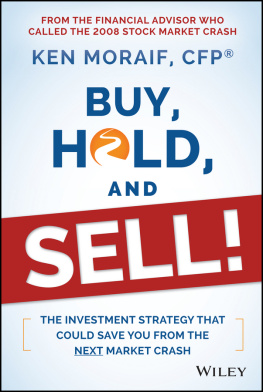
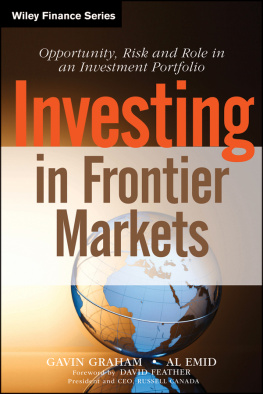
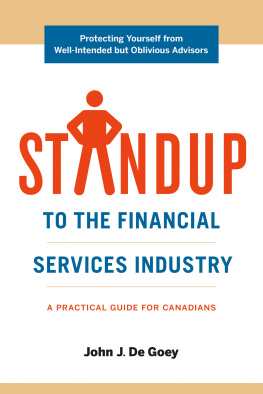
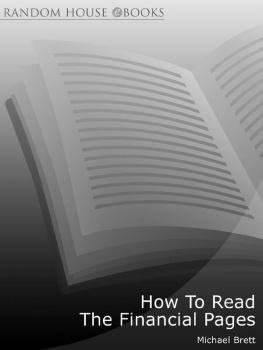
![Tim Richards [Tim Richards] - Investing Psychology: The Effects of Behavioral Finance on Investment Choice and Bias, + Website](/uploads/posts/book/124122/thumbs/tim-richards-tim-richards-investing-psychology.jpg)






